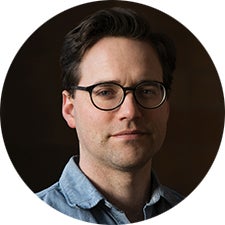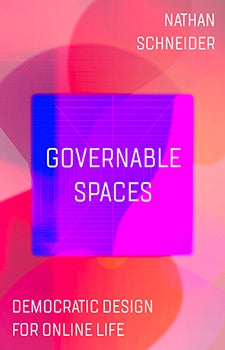Virtual homesteaders built an internet of ‘little autocracies.’ Is digital democracy doomed?
You are here
By Joe Arney
When his mother was elected president of her neighborhood gardening club, it prompted Nathan Schneider to think differently about his work.
 No, he isn’t a horticulturist, and while he has a wall-sized painting of a nature scene on display in his office, his research doesn’t focus on the natural world. Instead, he studies democracy and governance as they play out online.
No, he isn’t a horticulturist, and while he has a wall-sized painting of a nature scene on display in his office, his research doesn’t focus on the natural world. Instead, he studies democracy and governance as they play out online.
“I was running a large online community and having problems managing the behavior that takes place in those spaces,” said Schneider, an assistant professor of media studies at the College of Media, Communication and Information at the University of Colorado Boulder. “Meanwhile, my mother’s garden club had bylaws, tools for solving problems, elected officers—ordinary stuff, nothing mysterious or experimental. Why is it that our online spaces haven’t caught up even to my mother’s garden club?”
Schneider’s work in this area—which looks back to the earliest online communities—has resulted in a new book, Governable Spaces: Democratic Design for Online Life, due out Feb. 27. The book explores what Schneider calls “implicit feudalism”—the logic of how online spaces have been organized, from the amateur-run digital bulletin boards to modern social networks. The typical online community, he said, has become “a kind of mini autocracy.”
“When you start a Facebook group, there’s no option to say, ‘I want the democratic version,’” he said. “It assumes all the power will emanate from whoever starts the group. That person alone has absolute ability to censor and exile others. No one else gets a say.”
The roots of this problem lie in the basic design of the internet. “Whoever owns the server, and can plug it in and take it out, has all the power,” Schneider said. But the problem is also cultural: “This is not only a configuration issue with the internet, but a matter of what we, the users, accept. Together, these are contributing to the worldwide rise of authoritarianism.”
No ‘democratic version’ option
“Why is it that our online spaces haven’t caught up even to my mother’s garden club?”
Nathan Schneider, assistant professor, media studies
In the book, Schneider explores ways to change the internet—from regulation to design—to build democratic online spaces that reinforce democracy in everyday culture and practice. He also presents experimental projects he and his students have developed, including a website for designing rules for communities, a mod for online games and an art exhibit that appeared at the UN Internet Governance Forum.
Questions of online governance and democracy have long fascinated Schneider. In addition to his teaching and research, he is director of CMCI’s Media Economies Design Lab and is a fellow at the college’s Media Archeology Lab, where much of his research on the origins of the tools and platforms that shaped the internet as we know it live. He also helped develop the conference on Local Tech Ecologies through the MED Lab, which has examined how to bring local ownership to social media platforms to improve the level of discourse.
That idea of democracy being about the everyday as well as the major election is key to both governance and how Schneider believes technology should operate. A book he returned to in the course of his research, The Virtual Community: Homesteading on the Electronic Frontier, offers a mid-1990s look at the democratic logic of the internet.
“It presented a vision that by enabling widespread access to the internet, you would produce democracy,” he said. “There was this idea that you could build democracies out of little autocracies through the conquest of virtual space. But those autocratic notions are so built into the platforms we use that you have to work against the defaults to practice democracy.”
Top-down democracy
His book explores different strategies to encourage democratic practices online. For instance, when the Senate Judiciary Committee excoriated a group of big tech CEOs earlier this month for how platforms like Facebook and TikTok are harmful to children—presaging a legislative fix—it was likely the first step in companies demanding even more aggressive data collection and policing of what kinds of content can be seen by different audiences.
 In other words, we continue to reinforce the top-down power dynamic that’s built our autocratic online communities.
In other words, we continue to reinforce the top-down power dynamic that’s built our autocratic online communities.
“What if instead of imposing democracy, we used it as a tool to solve these problems?” Schneider said. “For instance, when it comes to conflicts among users in social media, what if we had more accountable judiciaries and ways to address problems together at the community level?”
It could be modeled on our court system, he added, where you can articulate a complaint, argue it and seek appropriate redress, but online, “we don’t have a way to address our problems more collaboratively, reinforces the idea that the only option is the mob option.”
He also encourages online communities to be more intentional about choosing technologies—a practice he’s brought to the MED Lab, which runs its own servers and governs the tools available to students—and advocates for blockchain. While this technology has so far been associated mostly with scams, “it is a reminder that we could design our networks differently—for more collective ownership, rather than the assumption that every service is somebody’s server plugged into a wall,” Schneider said.
‘No separation’ between internet, democracy
One of the biggest takeaways in the book is the notion that we can no longer consider what the internet is doing to democracy—we should also think about democracy on the internet.
“There is no separation between the two,” Schneider said. “If we’re going to live so much of our lives online, it really matters how we organize ourselves there. If we’re serious about a democratic society, we need to be serious about a democratic internet.”
Even as the mainstream media have beat a steady drum of doom about the general election, the course of his work has made Schneider more hopeful about the less-told stories of people working to influence democracy in their everyday lives.
As he is quick to point out, that’s been a bedrock of democracy since Alexis de Tocqueville visited in the 1800s.
“I’ve taken a lot of hope from focusing my attention on what people are doing at other levels, and in focusing on advancing democracy, rather than just defending it,” he said. “That’s something Tocqueville saw—that this cannot be a static practice. That’s just as true of how we live and engage online.”
